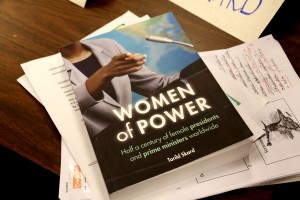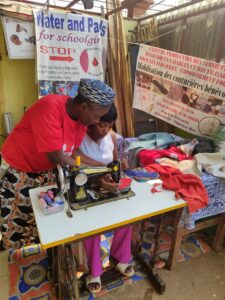 In her book ‘Women of Power- half a century of female Presidents and Prime Ministers world wide’, Torild Skard tries to answer what difference gender makes in top political jobs.
In her book ‘Women of Power- half a century of female Presidents and Prime Ministers world wide’, Torild Skard tries to answer what difference gender makes in top political jobs.
According to Torild, gender does make a difference. 1/3 of the women leaders she studied challenged the prevailing male domination. But, Torild claims, this is not enough. To be able to implement women friendly policies, women leaders must have the support of an active women’s movement.
Moreover, the political system must work in a democratic way and top leaders must obtain support in central political institutions.
Torild Skard explains the small percentage of increase of women in top leadership positions from 1990 to 2010 by the fact that political parties, which are the gateways to power in practice, undermine democratic governance preventing women from making progress in politics.
There are many measures that can be taken to help women access decision-making positions in politics: the quota system, access to the media and political networks, measures for reconciling work with family life etc. The problem is whether these measures have any effect and if not, why?
The answer is negative because these measures do not challenge patriarchy i.e. gender stereotypes, gender culture, and traditional roles.
Experience in Scandinavia, which has high percentages of women in top leadership positions, has proved that this is not enough to challenge and transform patriarchal codes and practices.
So what can be done?
In my view, the answer is the lack of an enabling environment at all levels for the empowerment of women and the realization of their human rights. This lack of an enabling environment is produced by development models that support market led growth only. These models contribute to the persistence of unequal power relations between women and men and reproduce gender inequalities, exploiting women’s labour and unpaid care work.
These patterns are based on a new form of capitalism disorganized, globalized, neo-liberal. This form of capitalism has replaced state managed capitalism of the post-war era. It relies heavily on women’s wage labour, especially low wage work in service and manufacturing. The reality that underlies this new model is depressed wage levels, decreased job security, declining living standards, a steep rise in the number of hours worked for wages, exacerbation of the double shift, and rising poverty increasingly concentrated in female headed households.
Neo-liberalism is driving poor people, in particular women, poor classes and poor countries deeper into poverty. Feminist organizations should work to ensure that human rights are the ethical framework for macroeconomic policies. They should participate in reforming dominant economic policies, that is neoliberal policies, including the development, implementation and evaluation of these policies. We all know that the women’s movement is the most critical factor in the implementation of gender equality policies. The women’s movement should strive for the full promotion of the human rights of women through the full implementation of all human rights instruments especially CEDAW.
We should demand a new development model that is not based solely on economic growth but prioritizes people over profits as well as social solidarity. A new development model that regulates the role of the private sector through binding frameworks that align their actions with human rights and sustainable development objectives.
We should also work for human rights accountability for all actors, international financial institutions, multinational corporations and national governments. This is a new field of activism that the women’s movement should follow in order to see progress in its struggle for gender equality and the realization of women human’s rights.


